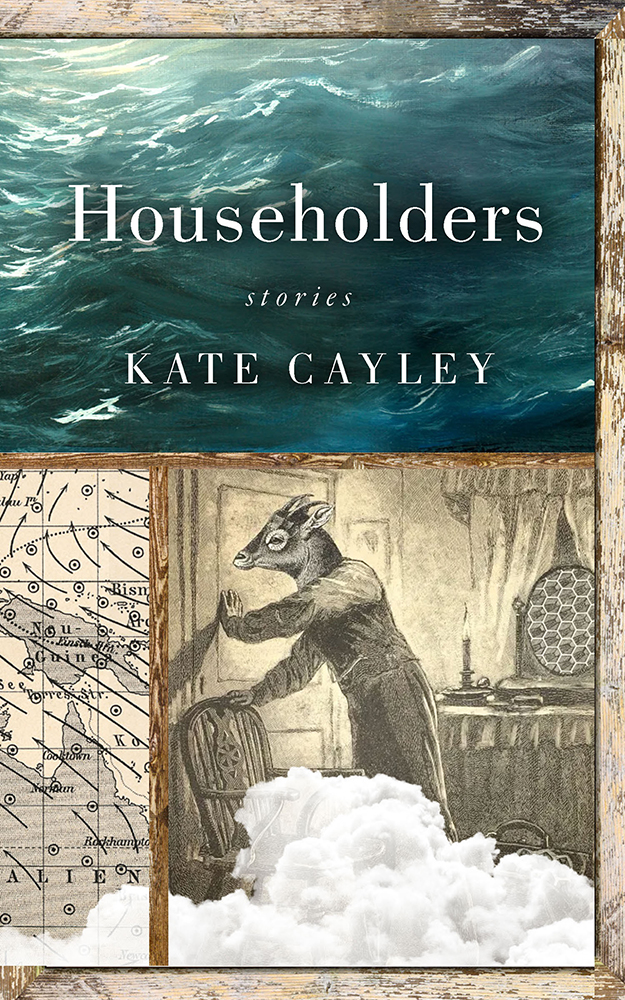Review of Householders
Biblioasis. 2021. 248 pages.
Connecting narratives in a short story collection can be a difficult task for an author, especially while maintaining a smooth transition between tales. This is certainly not a problem for Kate Cayley in her short story collection, Householders. The absorbing stories move across time and space and are intricately knitted together in a way that appeases our need for structure, while commenting on the tales we tell ourselves about our lives. Cayley examines what happens when we are faced with the reality of life, when one realizes that they have clung onto something that is “more like a story of a life” than the real thing.
Cayley, a playwright, fiction writer, and poet, won the 2015 Trillium Book Award for her collection of short stories, How You Were Born, which focuses on the bizarre and tragi-comic nature of our lives. Working in that same rich territory, the stories in Householders (set in Toronto) focus on family relationships and individuals struggling with identity as they join and leave fraught social groups. Cayley’s precision with language and facility with revealing the hidden layers of a life makes you think about the secrets we all keep, and leaves you questioning the backstory of every individual around you on crowded city streets. Cayley’s characters show us what life can become through age, trauma, and experience, and how the artfully messy nature of life itself shapes an individual character.
Throughout Householders, we follow Naomi, her child Trout, and other characters who follow a self-proclaimed prophet named John to a commune in Maine. Cayley skillfully plays with time, providing us with glimpses into these characters’ lives at various points of faith and crisis. Naomi eventually leaves the commune in the middle of the night with a sleepy, malnourished Trout in her arms; when we revisit this pair, time has shifted forward considerably. Cayley’s narrative is not in any way concerned with linearity, and we are often left wondering after certain characters while she delves into apocalyptic musings or domestic woes. However, just when we are swept into those other moving existences, up pops a middle-aged Trout, returning Naomi to the life they once so decidedly abandoned. Cayley offers her readers a glimpse into the generational aftermath of commune life, though the stories span across time in such gentle shifts that you wander through their progression dreamily.
Cayley’s narrative is interspersed with apocalyptic, other-worldly moments that reflect our contemporary existence while hinting at possible futures – in which things get much worse. The pandemic that spans across the narrative takes on varying forms. At certain moments, it mirrors the methodically-placed squares taped onto the ground that we’ve had to stand on while in line for the past two years. Then there is the alternative pandemic – the one which entails the devastating loss of our life as we know it – where the obscenely rich escape to survival bunkers buried deep beneath a field. This pandemic is a depiction of a life that feels both impossibly futuristic and eerily close to our foreseeable future.
In certain stories, Cayley captures what it feels like to exist in liminality, on the border between one’s social world and the preoccupations of their own mind. It can sometimes feel as though the external world (and the people therein) circulate at a distance from Cayley’s characters, who drink in their surroundings with an air of diffidence. Whether it is a woman masquerading as a nun and scamming a man on the internet, or a mother seeing too much of herself in the son who struggles to associate with the world around him, there is a sense of being removed from the world as it is intended to be experienced.
Cayley ingeniously delves into the subtleties and nuances of gender and sexual expression. She explores the parts of queerness that we usually forget about, that we tend to render insignificant but which actually make up our individuality in significant ways. It could be something as small as a brush against one’s leg or the way a friend turns their head toward someone who is decidedly platonic, suddenly unable to help blurring the line between romantic feelings and friendship. It is through these encounters that Cayley explores how queer individuals begin to understand their place in the world, and how sexuality is experienced before it is a solidified part of one’s identity. Sexuality is offered a spot in the background of this text, informing the situations at hand while operating within the imperative context of a life. It is through Cayley’s subtle nod to sexuality that queerness is homogenized into the conglomerate of other daily experiences: it is casual, something expected.
Kate Cayley’s stories are haunting in their own right. They speak to our contemporary world that is teeming with tales, worries and possibilities (both bad and good); though there is a shimmer of warning within these narratives – of what our world can become if we are not careful. The intermingling of topics in Householders ultimately provides a rich understanding of the world. It illuminates the intricacies of the lives around us, yet it also makes us feel connected to each and every part of our messy existence. Though Cayley tends to dwell in the fantastic, her tone is markedly realistic, attuned to our current state of affairs while positing the extreme alternatives our subconscious can conceive, oftentimes through a will of its own.

